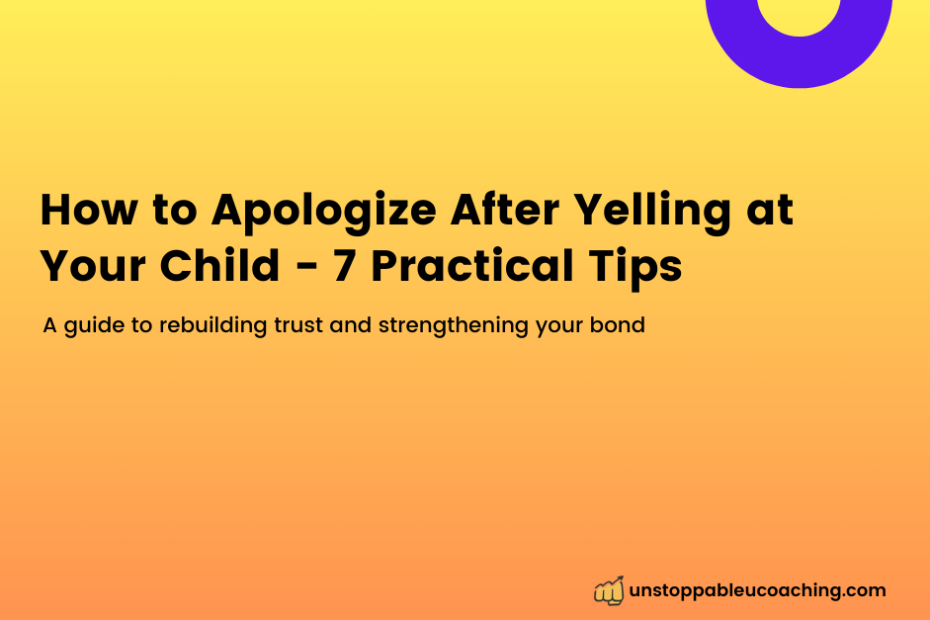The last thing you’d do as a parent is apologize to your kid.😂 “I mean, come on, the kid that I’ve always lectured – how can they be right and I be wrong? And how in the world would I say sorry to them?” These thoughts are always in the back of our minds when we have any arguments with our kids. 🙈
Let’s face it: we all lose our cool sometimes. 🥵 Maybe you snapped at your kid for spilling juice or yelled during a homework meltdown.
It happens.
The good news is, there’s a way to repair the damage and strengthen your bond with your child.
It’s called an apology. We’ll dive into how to do it right, so you can move forward and create a stronger, healthier relationship with your child.
7 Tips on How to Apologize After Yelling at Your Child
Apologizing to your kids isn’t easy. 😅 The ego often gets in the way, 😤 and if you don’t do it correctly, ❌ the apology won’t accomplish much in terms of resolving the issue. 😕 So, I’d like to share some tips for a sincere apology that works: 👍
1. Cool Down First
Before you jump into apologies and repairs, it’s crucial to hit the pause ⏸️ button and let yourself cool down. Trying to mend fences while you’re still feeling heated is like trying to bake a cake while the oven’s on fire – it’s not going to end well.
Take a few deep breaths, 🧘♀️ step away from the situation, or engage in a calming activity like deep breathing or taking a short walk.
Once you’ve regained your composure, you’ll be better equipped to handle the situation with empathy and understanding.
2. Own Up To Your Mistake
A sincere apology is the cornerstone of repairing a ruptured relationship. It’s about taking full responsibility for your actions, without excuses ❌ or blame-shifting. We’ve all heard apologies that start with “I’m sorry, but…” – those don’t count!
A genuine apology includes:
- Acknowledging your mistake: “I was wrong to yell at you.”
- Explaining your behavior without blaming your child: “I was feeling overwhelmed and frustrated.”
- Empathizing with your child’s feelings: “I know that must have been scary and hurtful.” 🥺
- Expressing remorse: “I’m really sorry for upsetting you.” 😢
Remember, it’s okay to admit you’re working on managing your anger. It shows your child you’re human and committed to growth.
An apology like, “I’m sorry I lost my temper. I’m working on getting better at handling my feelings,” can be incredibly powerful.
3. Listen to Your Child and Get Their Perspectives 👂
Once you’ve apologized, it’s time to truly listen to your child. Give them the space to express their feelings without interruption. Ask open-ended questions like:
- “How did that make you feel when I yelled?” 😢
- “Can you tell me what happened from your perspective?” 👀
- “What were you thinking or feeling before I got upset?” 🤔
Resist the urge to defend yourself or offer explanations.✋ This is about understanding their experience, not justifying your actions. ❌
Creating a secure environment for your child to talk about their feelings helps build trust and shows them that their emotions are important to you.
Note: Having trouble communicating with your children? Read: 7 Tips on Communicating With Your Teen.
4. Give a Hug 🤗
Physical touch is a powerful tool for healing and reconnection. A warm hug releases oxytocin, the “love hormone,” which promotes feelings of trust, safety, and bonding.
When we hug our children, we’re sending a clear message: “I love you, you’re safe, and I’m here for you.” This simple act can go a long way in repairing a strained relationship. 🤝
Remember, the type of physical touch should be comfortable for both you and your child. A gentle hug, a pat on the back, or even holding hands can be effective. 🙌
5. Explaining Why It Happened
Understanding the importance of explaining the reason behind your behavior is crucial for repairing a strained relationship with your child.
By providing a reason for your actions, you:
- Humanize yourself: You’re acknowledging that you’re not perfect and that everyone has moments of stress or frustration.
- Create space for compassion: Your child is more likely to empathize with you when they understand the underlying cause of your behavior.
- Model open communication: You’re demonstrating that it’s okay to be vulnerable and share your feelings.
- Promote problem-solving: By discussing the situation, you’re opening a dialogue about how to handle similar situations in the future.
Example:
- “I’m sorry for being so short with you when you asked to hang out. I was feeling really overwhelmed with work and I snapped. I know that’s not fair to you, and I’m really sorry.” 😔
This approach helps shift the focus from blame to understanding, promoting a healthier and more connected relationship with your child. 🌈
6. Show It Won’t Happen Again 💪
An apology is more than words; it’s a commitment to change. It’s about showing your child you understand the impact of your actions and are taking steps to prevent a repeat. 🔄 While promising to never yell again is unrealistic, demonstrating a plan to manage your reactions is tangible.
💡 For example, adding, “I know that wasn’t okay, and I’m working on managing my anger better. Next time, I’ll try to take a deep breath instead of reacting,” shows your child you’re actively addressing the issue. Remember, actions speak louder than words. Consistent efforts to improve your behavior will reinforce your apology and strengthen your bond. ❤️
7. Seek Help When Necessary
There are days when you feel like a superhero, deftly juggling demands, tantrums, and tiny humans with the grace of a seasoned acrobat.
Then there are those moments when you’re pretty sure you’re failing miserably at adulting. 😅 And yet, you keep going, because in the midst of the chaos, there’s a magic that’s hard to explain.
If you find yourself exploding like a volcano more often than not, it might be time to consider anger management. Uncontrolled anger can strain relationships, damage your reputation, and even lead to physical consequences. ⚠️
Anger is a normal human emotion, but when it consistently overtakes you, it’s a sign that something needs to change.
Anger management techniques can provide you with tools to identify triggers, understand your anger, and develop healthier ways to cope.
Remember, seeking help isn’t a sign of weakness; it’s a step towards a calmer, more fulfilling life. ❤️
Final Thoughts … 💭
Yelling at your child is a tough pill to swallow, but it’s a common experience that doesn’t define you as a parent. 😞 The key is in how you respond to these moments. 🔑
It’s when you understand your triggers, practice self-care, and make sincere apologies, you’re taking steps to foster a stronger, healthier relationship with your child. 💪
Remember, parenting is a journey filled with ups and downs. Be kind to yourself, and don’t hesitate to seek support if needed. You’re not alone in this.
Need more guidance on crafting the perfect apology? Unstoppable U offers expert coaching to help you navigate challenging parent-child moments and build stronger connections. Learn more and sign up today! 🚀

